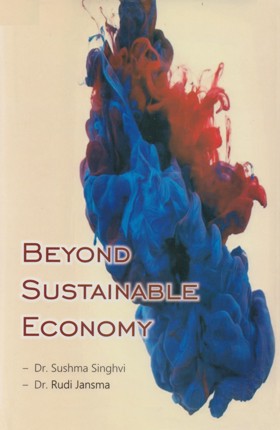Jainism is now known the world over as an environment friendly religion on account of its basic principles which enjoin its followers to minimize their needs, restrain the activities of their mind, body and speech, refrain from avoidable violence and have reverence for all life forms which are independent sentient entities endowed with souls. According to Jainism each sentient entity is an independent jīva[2] which may be born again even as a human being and is likely to be liberated if he or she (an embodied soul) lives a good life embedded in ahimsa (nonviolence) and annihilates his or her karmic bondage by exercising restraint on his or her activities be they mental, verbal or physical.
The omniscient Jain preceptor Lord Mahāvīra realized that the entire earth consists of two kinds of substances jīva (those entities which are endowed with souls) and ajīva (the material objects without souls). Worldly life results from the interaction between the soul and matter. Whatever a soul possesses, whether a speech organ, a respiratory system, brain etc. is the result of its association with matter. Thus ajīva (matter) helps a jīva and the cycle of life continues on this planet. He explains that sentient entities or souls are of two kinds those that have mind and those that are without mind. The worldly souls are further categorized as mobile and immobile beings. Immobile beings include the earth-bodied, water-bodied, fire-bodied, air-bodied and plant-bodied beings. By immobile beings Mahavira means those sentient entities which have souls and which grow, ripen and die but are not able to move voluntarily. It is they that constitute nature. They are identified as trees, plants, hills, rivers which sustain not only human life but all other forms of mobile creatures such as microbes, insects, animals and birds. Mahavira further states that all living beings want to live, no one wants to die, even an insect wants to live, so one should be careful lest any of these mobile beings be killed.
But a worldly embodied soul has to commit violence in some or the other form to survive. So Mahavira enjoins his followers to at least refrain from avoidable violence like hunting, felling green trees and using water, earth, fire wantonly. The ideal is to live and let every living being live but since a householder needs water, fire, plants for his sustenance, living beings with one sense are inevitably killed. This is the way of the world. A householder cannot refrain from violence completely but he is expected to minimize it. The Jain ecologic ethic makes it obligatory for the Jains to abstain from intentional killing of innocent living beings, be they small or big, use water, plants, earth and related resources of the planet sparingly and minimize their daily needs by setting strict limits on their levels of consumption. For example a Jain śrāvaka (votary) takes a vow that he would eat less than the level of his hunger, use only two or three buckets of water for his bath daily, limit his area of travel and share his resources with others. This pattern of behavior exhibited by the Jains constitutes Jain Ecologic Ethic since it defines his relationship with other jīvas and environment.
Interconnectedness of jīvas the core of Jain ecology
The Jain ecology is based on the natural phenomenon of interdependence. The basis of the modern science of ecology is symbiosis. It deals with the relationships of organisms to their surroundings and to other organisms. There is a thread of interconnectedness that binds all life forms together whether they are humans or non-humans. Mahavira reveals a profound truth when he says, "One who neglects or disregards the existence of earth, air, fire, water and vegetation disregards his own existence which is entwined with them[3]". It is this relationship of a jīva with other jīvas that matters. He asserts that all life is bound together by mutual support and interdependence (parasparopagraho jīvanam[4]). Life is a gift of togetherness, accommodation and assistance in a universe teeming with independent entities. Mahavira gives an important sūtra, "Taking life away out of passion is violence"[5], but if a person happens to kill living organisms unintentionally as he walks, it is not violence in its strict sense. Passion includes powerful emotions of anger, pride, deceit and greed. It is the passion (kaṣāya) which is responsible for all forms of violence towards fellow beings, towards nature. It is a person's deliberate, wanton and passionate act that destroys both humans and non-humans. Ecological harmony and environmental protection result from our controlled behavior free from impulsive impetuosity and passionateness.
Deep Ecology and the Jain principles
Jainism, as a matter of fact, is 'deep ecology'[6] propounded by the modern eco-philosopher Arne Naess (1912-2009) who laid down eight points to highlight its salient features. They are: (i) the flourishing of human and non-human life on earth is inherently valuable; (ii) richness and diversity of life forms contribute to the flourishing of both human and non-human life on earth; (iii) humans have no right to reduce this richness and diversity except to satisfy vital needs; (iv) substantial decrease of the human population will help flourishing of non-human life; (v) present human interference with non-human world is excessive; (vi) changes in policies are necessary in basic economic, technological and ideological structures. If it is done, it will result in a more joyful experience of the connectedness of all things; (vii) ideological change means appreciating life quality rather than an increase in higher standard of living. It means awareness of the difference between big and great; (viii) those who believe in the above points must participate in an attempt to implement the necessary changes.
When I analyze Naess's ecological wisdom embedded in his eight points, I am astonished by its striking similarities with what Mahavira had said 2600 years ago. The flourishing of both human and non-human life depends on a human being's compassion towards other living beings on this planet. Mahavira's emphasis on the minimization of violence matches Naess's third point when he says that humans have no right to reduce diversity except to satisfy vital needs. Here he only echoes Mahavira's advice to refrain from unnecessary violence.
Another modern philosopher, Henry David Thoreau also endorses Jain ecology "I went to the woods because I wished to live deliberately," he wrote, "to front only the essential facts of life and see if I couldn't learn what it (woods) had to teach, and not, when, I came to die, discover that I had not lived." Both these philosophers spent some time in the lap of nature and experienced the truth themselves. It is their communion with nature that elicited the truth that man should take from nature only that which is essential for his survival.
The word jiva instead of the soul is used in the Jain scriptures. While the soul is an independent eternal entity, a jiva is an embodied soul. The Jains believe that a soul has to pass through a cycle of death and birth so long as the karmic bondage remains sticking to it. The karmas are generated by an embodied soul's activities of mind, body and speech.
According to Jain philosophy there are two kinds of living beings those which can move (trasa) and those which can't move (sthavara). Trasa jīvas are earth, air, fire, water and vegetation they are all sentient entities and have only one sense i.e. touch. But they feel immense pain when they are hurt. So a Jain who wants to follow the path of ahimsa cannot neglect them.
It is considered Lord Mahavira's oft-quoted ecological statement. The modern science also recognizes that all life forms that exist on this planet are bound together. Each sentient entity has a role to maintain ecological balance.
This sutra also makes it clear that a householder can't abstain from violence in its entirety. He has to fulfil his basic needs which depends on use of water, air, fire and vegetation. But if a householder doesn't indulge in deliberate or intentional violence, it is not considered violence. Mahavira advises his followers to refrain at least from deliberate violence.
 Dr. Rudi Jansma
Dr. Rudi Jansma
 Dr. Sohan Lal Gandhi
Dr. Sohan Lal Gandhi
